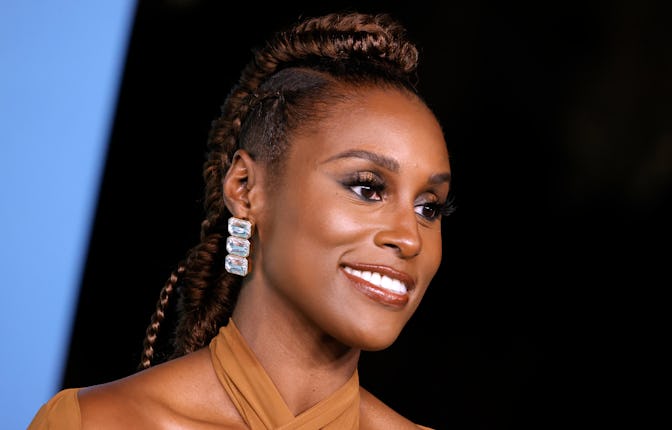Issa Rae used Insecure to push the music industry to be better
Now that the show has ended, her company Raedio continues to advocate for indie Black artists.

For five years, Insecure paired its varied depictions of the experience of millennial Black women with musical choices that surely turned HBO viewers into fans of artists they had previously never heard of. But over time, the show became the meritocratic blueprint that the show’s creator and star Issa Rae wishes she saw in the music industry.
In a recent interview with The L.A. Times, Rae was adamantly critical of the music industry, bestowing it with the ignominious title of “probably the worst industry I have come across.” That distinction is quite harrowing considering Rae has spent most of her career in a TV and film industry she once claimed wouldn’t become more diverse until racist old executives started dying. But based on her limited time as a music executive since starting her own “audio everywhere company” Raedio, she believes the music industry’s exploitative treatment of artists is so pervasive the entire industry needs to start over.
“I thought Hollywood was crazy. The music industry, it needs to start over. Conflicts of interest abound. Archaic mentalities. Crooks and criminals! It’s an abusive industry, and I really feel for artists that have to come up in it,” Rae said.
Some of Issa Rae’s earliest exposure to the predatory music industry was through Insecure and its distinctive soundtrack, which she has worked on with composer Raphael Saadiq and music supervisor Kier Lehman. Compilations of the best music featured in Insecure episodes have been released for each season since 2016. The process of releasing the soundtracks was anything but easy, and Rae describes working out deals with artists and labels as shockingly “convoluted.” She launched Raedio in October 2019 and partnered with Atlantic Records for the company’s record label arm.
It can not be understated how drastically different the music featured in Insecure was to music industry as a whole. Most of the artists featured on the first seasons’s soundtrack had yet to release a full-length project on a major label. Artists like Goldlink, Sampha, and The Internet would go on to achieve moderate mainstream success after being featured on the first season’s soundtrack. “We highlighted female singers and rappers in a distinct way when others weren’t — I’m thinking about TT the Artist and Kari Faux in Season 1,” Issa Rae said.
You wouldn’t know who were Grammy favorites or the hottest artist scorching the Billboard charts when you watched Insecure. H.E.R. is the only Black woman to win Song of the Year at the Grammy Awards between 2016-2021, while the musical DNA of Insecure was predominantly the voices of Black female singers. The first single for the last Insecure soundtrack she’ll ever release was a song called “Fun” from Nnena, an artist who’s never sniffed the Billboard charts, yet was chosen to be the first taste of the original music from the final season of one of the most impactful Black TV shows of the last 20 years. For Rae, if the music industry institutions like the Grammy Awards weren’t going to properly celebrate the musical contributions of Black people, Insecure always would.
“A song like [Wizkid’s] “Essence” — just absolutely a powerhouse, and yet could not be properly acknowledged by the institution that is supposed to celebrate the best in music — that trips me out.”
Artists being taken advantage of by music industry executives is tale as old as A Tribe Called Quest’s industry rule #4080 from the early ‘90s. Unfortunately, 2021 has seen the insidious cycle continue. Meek Mill has sold millions of records, including a 5x-platinum “Going Bad” collaboration with Drake, and still blasted his record label for never compensating him for his music sales. Bobby Shmurda’s highly anticipated release from prison occurred in February, but the in-demand rapper didn’t release a single song until more than six months later due to rumored disputes with his record label Epic Records. After releasing four songs in the last four months of the year, Shmurda gave credence to the rumors by revealing he hasn’t been in control of his music in more than a decade and doesn’t know when his music drops. Even execs known for being pro-artist have been hit with criticism: Big Sean stated on Drink Champs that an audit revealed that G.O.O.D. Music boss Kanye West owes him millions of dollars, and Rolling Stone reported that label/management firm LVRN signed Summer Walker to a “brutal” record deal (LVRN co-founder Tunde Balogun denied the accusations). Rae’s assessment of the music industry is depressingly dead-on.
Outside of Insecure, Rae has been helping young Black artists break through a music industry that regularly blocks out young talent through gatekeeping. Baby Tate signed to Raedio in April 2020 and went on to go from best kept secret to viral sensation in her first year with the label, with her affirmation anthem “I Am” becoming her first major hit. Moving forward, Rae is planning to give Black female rappers more visibility with her upcoming HBO Max series Rap Sh*t centered around a pair of female rappers struggling in Miami. If the unprecedented opportunities Rae gave Black musicians on an HBO hit series for five years is any indication of her musical pursuits post-Insecure, then the music industry could look drastically different when she gets through with it.